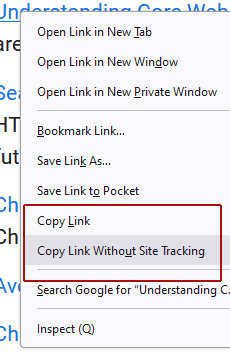Firefox URL Monitoring Removing – Is This A Pattern To Watch?

Firefox not too long ago introduced that they’re providing customers a alternative on whether or not or to not embrace monitoring data from copied URLs, which comes on the on the heels of iOS 17 blocking person monitoring by way of URLs. The momentum of eradicating monitoring data from URLs seems to be gaining velocity. The place is that this all going and may entrepreneurs be involved?
Is it potential that blocking URL monitoring parameters within the identify of privateness will turn out to be a pattern industrywide?
Firefox Announcement
Firefox not too long ago introduced that starting within the Firefox Browser model 120.0, customers will be capable to choose whether or not or not they need URLs that they copied to comprise monitoring parameters.
When customers choose a hyperlink to repeat and click on to boost the contextual menu for it, Firefox is now giving customers a alternative as as to if to repeat the URL with or with out the URL monitoring parameters that could be connected to the URL.
Screenshot Of Firefox 120 Contextual Menu
![]()
![]()
Based on the Firefox 120 announcement:
“Firefox helps a brand new “Copy Hyperlink With out Website Monitoring” function within the context menu which ensures that copied hyperlinks not comprise monitoring data.”
Browser Tendencies For Privateness
All browsers, together with Google’s Chrome and Chrome variants, are including new options that make it tougher for web sites to trace customers on-line by means of referrer data embedded in a URL when a person clicks from one website and leaves by means of that click on to go to one other website.
This pattern for privateness has been ongoing for a few years but it surely grew to become extra noticeable in 2020 when Chrome made modifications to how referrer data was despatched when customers click on hyperlinks to go to different websites. Firefox and Safari adopted with comparable referrer habits.
Whether or not the present Firefox implementation could be disruptive or if the influence is overblown is form of apart from the purpose.
What’s the level is whether or not or not what Firefox and Apple did to guard privateness is a pattern and if that pattern will prolong to extra blocking of URL parameters which might be stronger than what Firefox not too long ago applied.
I requested Kenny Hyder, CEO of on-line advertising and marketing company Pixel Foremost, what his ideas are in regards to the potential disruptive facet of what Firefox is doing and whether or not it’s a pattern.
Kenny answered:
“It’s not disruptive from Firefox alone, which solely has a 3% market share. If different well-liked browsers observe go well with it may start to be disruptive to a restricted diploma, however simply solved from a entrepreneurs potential.
If it grew to become extra intrusive and so they blocked UTM tags, it might take awhile for all of them to catch on if you happen to had been to bypass UTM tags by merely tagging issues in a collection of sub-directories.. ie. website.com/touchdown/<tag1>/<tag2> and so on.
Additionally, most savvy entrepreneurs are already integrating future proof workarounds for these precise eventualities.
Lots could be finished with pixel primarily based integrations somewhat than cookie primarily based or UTM monitoring. When arrange correctly they’ll truly present higher and extra correct monitoring and attribution. Therefore the identify of my company, Pixel Foremost.”
I believe most entrepreneurs are conscious that privateness is the pattern. The nice ones have already taken steps to maintain it from turning into an issue whereas nonetheless respecting person privateness.”
Some URL Parameters Are Already Affected
For individuals who are on the periphery of what’s occurring with browsers and privateness, it might come as a shock that some monitoring parameters are already affected by actions meant to guard person privateness.
Jonathan Cairo, Lead Options Engineer at Elevar shared that there’s already a restricted quantity of monitoring associated data stripped from URLs.
However he additionally defined that there are limits to how a lot data could be stripped from URLs as a result of the ensuing unfavourable results would trigger essential net searching performance to fail.
Jonathan defined:
“Thus far, we’re seeing a selective pattern the place some URL parameters, like ‘fbclid’ in Safari’s non-public searching, are disappearing, whereas others, equivalent to TikTok’s ‘ttclid’, stay.
UTM parameters are anticipated to remain since they concentrate on person segmentation somewhat than particular person monitoring, offered they’re used as meant.
The thought of utterly eradicating all URL parameters appears unbelievable, as it might disrupt key functionalities on quite a few web sites, together with banking providers and search capabilities.
Such a drastic transfer may lead customers to change to different browsers.
Alternatively, if just some parameters are eradicated, there’s the potential for entrepreneurs exploiting the remaining ones for monitoring functions.
This raises the query of whether or not corporations like Apple will take it upon themselves to stop such use.
Regardless, even in a state of affairs the place all parameters are misplaced, there are nonetheless alternative routes to convey click on IDs and UTM data to web sites.”
Brad Redding of Elevar agreed in regards to the disruptive impact from going too far with eradicating URL monitoring data:
“There’s nonetheless an excessive amount of primary web performance that depends on question parameters, equivalent to logging in, password resets, and so on, that are successfully the identical as URL parameters in a full URL path.
So we imagine the privateness crackdown goes to proceed on identified trackers by blocking their monitoring scripts, cookies generated from them, and their means to observe person’s exercise by means of the browser.
As this grows, the reliance on manufacturers to personal their first occasion knowledge assortment and convey consent preferences right down to a user-level (vs session primarily based) will likely be important to allow them to backfill gaps in conversion knowledge to their promoting companions outdoors of the browser or gadget.”
The Future Of Monitoring, Privateness And What Entrepreneurs Ought to Count on
Elevar raises good factors about how far browsers can go by way of how a lot blocking they’ll do. Their response that it’s right down to manufacturers to personal their first occasion knowledge assortment and different methods to perform analytics with out compromising person privateness.
Given all of the legal guidelines governing privateness and Web monitoring which have been enacted all over the world it seems like privateness will proceed to be a pattern.
Nonetheless, at this level it time, the recommendation is to maintain monitoring how far browsers are going however there isn’t any expectation that issues will get out of hand.
Supply hyperlink




